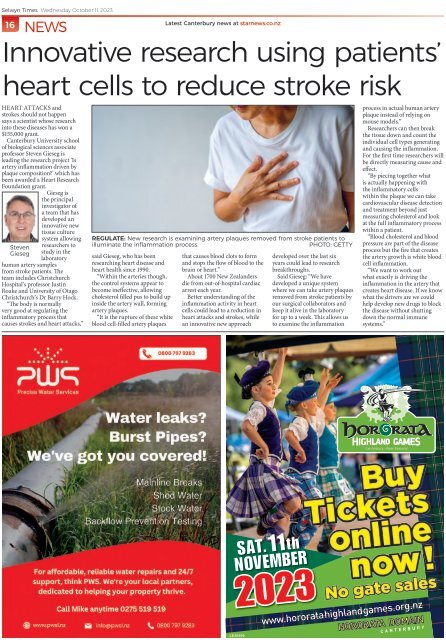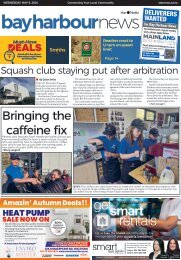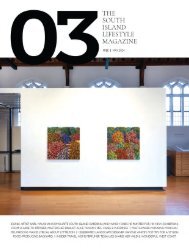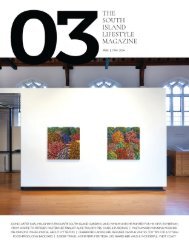Create successful ePaper yourself
Turn your PDF publications into a flip-book with our unique Google optimized e-Paper software.
<strong>Selwyn</strong> <strong>Times</strong> Wednesday <strong>October</strong> <strong>11</strong> <strong>2023</strong><br />
16<br />
NEWS<br />
Latest Canterbury news at starnews.co.nz<br />
Innovative research using patients’<br />
heart cells to reduce stroke risk<br />
HEART ATTACKS and<br />
strokes should not happen<br />
says a scientist whose research<br />
into these diseases has won a<br />
$155,000 grant.<br />
Canterbury University school<br />
of biological sciences associate<br />
professor Steven Gieseg is<br />
leading the research project ‘Is<br />
artery inflammation driven by<br />
plaque composition?’ which has<br />
been awarded a Heart Research<br />
Foundation grant.<br />
Gieseg is<br />
the principal<br />
investigator of<br />
a team that has<br />
developed an<br />
innovative new<br />
tissue culture<br />
system allowing<br />
Steven<br />
Gieseg<br />
researchers to<br />
study in the<br />
laboratory<br />
human artery samples<br />
from stroke patients. The<br />
team includes Christchurch<br />
Hospital’s professor Justin<br />
Roake and University of Otago<br />
Christchurch’s Dr Barry Hock.<br />
“The body is normally<br />
very good at regulating the<br />
inflammatory process that<br />
causes strokes and heart attacks,”<br />
REGULATE: New research is examining artery plaques removed from stroke patients to<br />
illuminate the inflammation process.<br />
PHOTO: GETTY<br />
said Gieseg, who has been<br />
researching heart disease and<br />
heart health since 1990.<br />
“Within the arteries though,<br />
the control systems appear to<br />
become ineffective, allowing<br />
cholesterol filled pus to build up<br />
inside the artery wall, forming<br />
artery plaques.<br />
“It is the rupture of these white<br />
blood cell-filled artery plaques<br />
that causes blood clots to form<br />
and stops the flow of blood to the<br />
brain or heart.”<br />
About 1700 New Zealanders<br />
die from out-of-hospital cardiac<br />
arrest each year.<br />
Better understanding of the<br />
inflammation activity in heart<br />
cells could lead to a reduction in<br />
heart attacks and strokes, while<br />
an innovative new approach<br />
developed over the last six<br />
years could lead to research<br />
breakthroughs.<br />
Said Gieseg: “We have<br />
developed a unique system<br />
where we can take artery plaques<br />
removed from stroke patients by<br />
our surgical collaborators and<br />
keep it alive in the laboratory<br />
for up to a week. This allows us<br />
to examine the inflammation<br />
process in actual human artery<br />
plaque instead of relying on<br />
mouse models.”<br />
Researchers can then break<br />
the tissue down and count the<br />
individual cell types generating<br />
and causing the inflammation.<br />
For the first time researchers will<br />
be directly measuring cause and<br />
effect.<br />
“By piecing together what<br />
is actually happening with<br />
the inflammatory cells<br />
within the plaque we can take<br />
cardiovascular disease detection<br />
and treatment beyond just<br />
measuring cholesterol and look<br />
at the full inflammatory process<br />
within a patient.<br />
“Blood cholesterol and blood<br />
pressure are part of the disease<br />
process but the fire that creates<br />
the artery growth is white blood<br />
cell inflammation.<br />
“We want to work out<br />
what exactly is driving the<br />
inflammation in the artery that<br />
creates heart disease. If we know<br />
what the drivers are we could<br />
help develop new drugs to block<br />
the disease without shutting<br />
down the normal immune<br />
systems.”


















